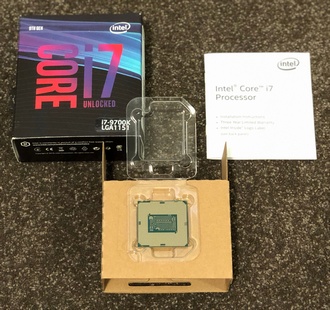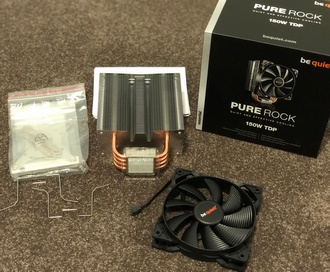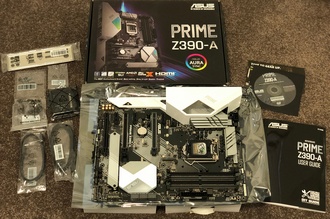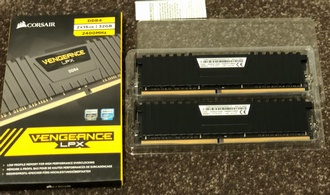Hardware Confusion 2019
[Page 3] My Choices: System Core
In this section, I lay out the rationale behind the parts I purchased, my experiences in installing, configuring and using them, their general performance, and of course, any quirks, tips or tweaks.
Disclaimer: I'm not sponsored by any hardware or software company. All of the parts in this article were purchased through normal retail channels from local Australian PC retailer PC Case Gear. No manufacturer or retailer provided me with free products, discounts, or any other inducements, and there are no affiliate or revenue-generating links in the body of this article. What follows are entirely my own thoughts and experiences.
CPU: Intel Core i7 9700K 3.6GHz 8 Core
CPU Cooling: be quiet! Pure Rock CPU Cooler
Motherboard: ASUS Prime Z390-A Socket 1151
RAM: 32GB (2x16GB) Corsair Vengeance LPX 2400MHz C14 DDR4
This first section is the longest, because we deal with the "core" of the new system: the CPU, its cooling system, the motherboard, and the RAM. This is the heart of your system; everything you do on your PC has to go through these components, so they need to be fast, versatile, and completely reliable. This is not an area where you should skimp.
Once you select a CPU, you are then typically locked into a fairly narrow range of cooling, motherboard and RAM choices. So the first choice you need to make is which CPU you want to buy. The good news is that in today's CPU market, resurgent competition between the two big CPU manufacturers Intel and AMD has create more choice. The bad news is that there is plenty of heckling and fanboyism, which makes it difficult to sort fact from fiction.
Interlude: AMD vs. Intel

I've lived on both sides of the fence; I've had AMD and Intel systems, I've had ATI and Nvidia GPUs. I don't consider myself a "fan" of any brand. The cold, hard, reality is that Intel, AMD, Nvidia, along with a whole range of other tech giants such as Microsoft, Google, Apple and Samsung, are simply companies looking to maximize their profits. Any portrayal of AMD as a pro-consumer underdog, versus the greedy, evil mega-corporates Intel and Nvidia, is, in my opinion, childishly simplistic. If AMD becomes dominant, I can guarantee that they will eventually start to charge the same as Nvidia or Intel for their products (see for example the new Radeon VII GPU), and behave in a similar manner to the current incumbents with regards to the alleged security backdoors and shady kickbacks, given enough time. Ultimately, AMD is an American public company, and maximizing profits is what their shareholders would expect and enforce, while assisting national security agencies is what the US Government will demand of them, and also enforce if necessary.
I can only present this as my opinion, informed through thirty years of observing developments in technology and dealing directly with these companies, including working closely with one of them for several years. This is not the same debate as open source vs. proprietary software, this is about the absurdity of attributing humanistic and emotional characteristics to a company, a profit-seeking entity made up of thousands of different people.
Please don't get caught up in the emotional partisan nonsense of fanboyism, such as the ongoing AMD vs. Intel debate, as it only leads to bad decisions. Let's compare the two CPU lines, the Ryzen series and the Core series, rather than debating which company is better. And let's try to do it by examining some facts.
Ryzen vs. Core
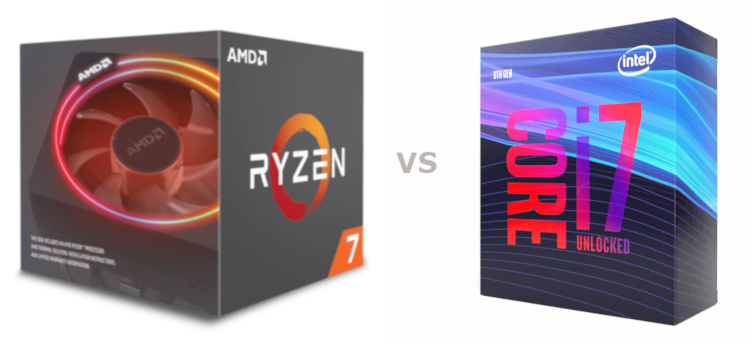
In December 2018, as I was contemplating which CPU to buy, there was a strong prima-facie case for buying AMD's top-end desktop chip, the Ryzen 7 2700X 8 Core/16 Thread CPU, rather than the Intel i7 9700K 8 Core/8 Thread CPU. There was, in some respects, an even stronger case for me to hold off on my upgrade altogether until the next generation of AMD Ryzen CPUs had been released, given they promised even greater performance increases because of their new 7nm architecture. This seemed to be the consensus on virtually every forum and in every comments section of every review - that anyone would be foolish to consider an Intel chip right now.
The crux of the argument is that the 2700X is a chip that can often meet or beat the top two Intel Core CPUs (i9 9900K and i7 9700K), yet comes in much cheaper, especially when you factor in total cost of ownership. This makes it a compelling proposition for many people. But the reality is that it's not that simple.
As I began researching, I found significant variability in the performance delta between the 2700X and its most direct competitor, the 9700K. Despite having the same number of physical cores as each other (8), the 2700X appears to performs much better in heavily multi-threaded tasks by using Simultaneous Multithreading (SMT) to provide 16 logical cores. The 9700K appears to performs better in primarily single-threaded tasks due to its much higher clock speeds on each core, starting at 3.6GHz but automatically boosting up to 4.9GHz, compared to the 2700X's 3.7GHz to 4.3GHz range.
Modern computing has, and likely will continue to have, for the foreseeable future, a mix of both single and multi-threaded tasks. Some tasks can never be completely parallelized to take full advantage of multi-core CPUs. PC gaming, for example, benefits more from higher clock speeds than additional threads. Hence the 9700K is generally reported as the better choice for gaming across several reviews, such as this one, or in the PC Gamer 2019 Best Gaming CPUs awards.
To be fair, the CPU is actually not an important component when it comes to something like gaming, because in real-world gaming at higher resolutions and settings, compared to the artificially low ones used in CPU reviews to accentuate the differences, the GPU is the main restricting factor; the choice of CPU doesn't make a big difference much of the time. Unfortunately, while more and more professional reviews mention this fact, a much better solution would be to only review CPUs using games run at real-world resolutions and settings.
Equally, it's important to understand that many of the multi-core benchmarks and scenarios in which the 2700X does beat the 9700K by a noticeable margin are not representative of real-world, or common usage scenarios for the majority of desktop PC users, who don't do any architectural design, nor create any content with rendered 3D objects. The real-world multicore benchmarks make it clear that there's often little practical difference between the 2700X and the 9700K. For example, the Geekbench cross-platform system benchmark that compiles results from a wide range of user submissions, shows the 9700K scoring in the top 3 for single core performance (6042 points) vs. the 2700X (4817); at the same time, in the multi-core aspect of the benchmark, the 9700K (28,766) is also 14 positions ahead of the 2700X (26,721).
Other real-world benchmarks tell a tale that's not as clear cut as you may have heard: this suite of results provided by AnandTech show the 9700K and 2700X evenly matched overall, trading blows in various measures, one ahead of the other, but never any one CPU being outright best. For example: In 7-Zip, the 2700X beats the 9700K overall (62,058 vs. 54,684), while in Handbrake, the 9700K beats the 2700X (175-196 FPS vs. 157-153 FPS). Yet another general benchmark, the UserBenchmark suite that once again draws from a large range of user-submitted results, shows that 14,766 9700K users get, on average, scores that are 113% higher across several areas than 74,191 2700X users.
The more I researched these two chips, the more it began to surprise me that there had been such exaggerated claims of differences, typically favoring the less expensive 2700X. There's been a lot of cherry-picking in terms of benchmark results, and far too many people, not just users, but also professional reviewers, who have simply parroted the "2700X is good for content creators, 9700K is good for gamers" line. Neither statement is really true.
Another consideration is the Z390 chipset on which the latest Intel motherboards are based, vs. the equivalent high-end X470 chipset used by AMD to support the Ryzen CPUs. As this article and this article highlight, the Intel chipset (arguably) provides better RAM support, more flexible PCI-e 3.0 configurations and I/O options, and as I discovered myself, and will demonstrate shortly, some excellent CPU management technologies. With the AMD AM4 platform's System on Chip (SoC)-like configuration, the choice of motherboard, and where you can connect various components becomes far more important for getting maximum performance, especially when overclocking, as this article explains.
Lastly, if price is high on your list of priorities, as it is for many people, then you may be focusing on the fact that the Ryzen is often promoted as the much cheaper, thus better, choice. The total cost of ownership for Ryzen can indeed be lower if you're happy to stick with the free and reasonably functional stock air cooler that comes with the 2700X, or you already have an AM4 motherboard that can take the Ryzen. But in an apples-to-apples comparison of roughly equivalent new Intel vs. AMD systems, you may find that this large price advantage turns out to largely be a myth.
While it's true that Intel doesn't provide any cooling with its 9th generation processors, to offset this, the i5, i7 and i9 K-designated CPUs are equipped with an Intel UHD Graphics 630 Integrated Graphics Processor (IGP), while the Ryzen CPUs have none. An IGP provides no real benefit to any serious gamer as it's far weaker than a discrete GPU. But surprisingly, the UHD 630 ranks very close to the GeForce GTX 285 - the high-end GPU I started off with in my previous system back in 2009. Can it run Crysis? Yes, it can run Crysis at fairly low but playable settings. So for casual gamers, as well as non-gamers like me, buying an Intel Core CPU means saving the cost of buying a separate GPU, as the IGP can easily provide basic desktop graphics functionality, up to and including playing back 4K video, as well as playing simple games.
If we want to quibble over the dubious benefits of Intel's IGP, then it's only reasonable to counter by asking just how many Ryzen 7 2700X owners are running stock air cooling and using low-end motherboards? It would seem silly to do so, because to get reasonable performance out of Ryzen it has to be overclocked as far as possible to raise its single-threaded performance. Furthermore, you need a high-end motherboard in order to give everything such as RAM, an NVMe SSD drive and the CPU itself, sufficient bandwidth. So a more realistic look at the price difference between a similar Ryzen and Core system would be as follows (prices taken from the US Newegg site):
Ryzen 7 2700X CPU $310, ASUS Prime Pro X470 Motherboard $170, Noctua D-15 or Scythe Mugen air cooler = $90 or $103
Total Cost = $570-$583
Intel Core i7 9700K $419, ASUS Prime Z390-A Motherboard $189, Be Quiet Pure Rock Cooler $36,
Total Cost=$644
While the two systems above are not identical, they're very similar: both high-end air-cooled 8 Core CPUs running on good quality, well-specced mid-range ASUS motherboards with comparable features. The price difference between these two packages is $74USD, or a little over 10%. I think we can put to rest the myth that Ryzen is substantially cheaper than Core.
One of the reasons the Intel CPUs are more expensive than the AMD equivalents is because there are genuine shortages of the 9th Gen Core lineup, so prices have not fallen, and in some cases, have risen, since these CPUs were released late last year. Intel as a company is doing it tough these days. But again, contrary to popular opinion, this is not because AMD is somehow crucifying them with Ryzen's amazing performance. The real story is that Intel is experiencing major supply issues due to poor yields, which means they can't keep up with the high demand for their CPUs. Intel is a victim of its own success combined with internal mismanagement over many years. Right now they're struggling to transition to the 10nm chip process, which they were supposed to do in 2016, just as AMD moves to the more efficient 7nm chip, and there's a shortage of 14nm Intel CPUs exacerbated by unexpectedly high demand for PCs. Facing these major supply constraints, Intel has chosen to prioritise production of its high-end server CPUs and mobile chips, shifting its focus away from the desktop market, creating a void in both the desktop and server markets for AMD to sell more Ryzen and Threadripper CPUs.
Let's be clear: AMD's CPUs are good, and AMD is gaining momentum, with its server market share up to 5% at the end of 2018, a very strong achievement. AMD share prices continue to rise strongly, just as Intel's share price has declined recently - but it's down by just 1.4% over the year, hardly a collapse. As the famous saying goes "Correlation is not causation": Intel's decline is not due to AMD's rise; if anything, AMD's rise is in part due to Intel's incompetence, combined with AMD's ability to capitalize on this with Epyc and Ryzen.
This is fundamentally an issue of Intel failing to meet demand for its chips, rather than a collapse in demand for Intel products because people are switching to AMD en masse. One stock analyst says: "I saw no evidence that AMD was having a significant negative impact on Intel. In fact, the release of Ryzen and Epyc chips has spurred Intel into working harder to produce performance out of its own chips.". An Israeli hedge fund manager in charge of $35b similarly sold AMD and switched to Intel recently. There are plenty of other examples which confirm the general market sentiment that Intel is still in a very solid position due to its size, and its many potential advantages in a post-PC world. There is no clear-cut Intel is losing, AMD is winning story.
You may not like what I've written, but frankly, I'm not writing it to please you. I'm not trying to convince you that Intel is better than AMD, or that Ryzen is worse than Core, or indeed, that I have a definitive answer one way or another. Everyone has a different take on the story, largely because almost everyone has a subjective interest. We develop preferences and find it difficult to overcome them, even in the face of conflicting information. The classic example is when people continue to use Microsoft Windows, yet also complain about Microsoft's monopolistic ways and the bad things in Windows 10, when there's a perfectly viable free alternative available in the form of Linux. Why do people do this? From personal experience, I know exactly why: because we prefer the comfort (and even discomfort) of the familiar, over the potentially more frightening unknowns that change brings with it. "Better the devil you know, than the devil you don't" as the saying goes.
I just want you to keep this information in the back of your mind, and think it over more carefully later. What you may have thought was an obvious choice: the much cheaper, much faster, much more efficient Ryzen from the rising star AMD vs. the hot, slow, overpriced, rehashed Core CPUs from the rapidly declining, bloated, evil Intel, seems to be an exaggerated oversimplification spread by fanboys.
As for the even better performance that the upcoming new generation of 7nm Ryzen CPUs seem to promise, this was a much more straightforward issue: I couldn't sit and wait for months to find out how it would turn out. When I began shopping for a new PC in December 2018, rumor had it that the Ryzen 3000 series would include 16 core/32 thread consumer CPUs at Intel-beating prices, and would be released "soon", possibly by April; at CES 2019 in early January 2019, AMD provided a taste of their next-gen performance with an unspecified 8 core Ryzen CPU prototype that matched the i9 9900K using 30% less power, to be released "in mid-2019". By the end of January 2019, the latest rumors centered on leaked benchmark scores purportedly showing a 12 core/24 thread Ryzen CPU that performs around the same as a Ryzen 2700X in single threaded tasks, but is 50% faster in multi-threaded scenarios. What the final chip looks like, how much it will cost, and when exactly it will hit the stores is still anybody's guess.
There was a pretty good chance that my old system wouldn't last long enough to see Ryzen 3000's release, and I didn't want to risk catastrophic damage to the reusable components if my PSU blew. My choice came down to the Ryzen 7 2700X or the Core i7 9700K, because the Core i9 9900K is not particularly good value in my opinion, nor easy to cool silently. I chose the i7 9700K because, in my subjective, but hopefully informed, opinion: its much higher clock speeds provide tangible performance benefits relevant to my usage, and I believe most real-world scenarios, both now and in the future, while its 8 cores mean multi-core performance is also good; I don't game anymore, so the IGP will come in handy when my 5 year old GTX 970 dies; and subjectively, I've always been pleased with Intel's software and general engineering quality, having just used an Intel CPU for ten years and an Intel SSD for seven years. So in my opinion, the price advantage wasn't sufficiently in Ryzen's favor to counter all of the reason above.
It's OK to be sceptical, and to see all of this as just an attempt to justify my Intel bias. Keep reading and you'll soon see evidence that accusations of excessive heat, poor performance, inefficiency, artificial removal of features, and a range of other largely fabricated or exaggerated claims against the Intel CPU simply do not hold when actual data is examined. After over a month of intensive usage, I can vouch that the i7 9700K is a fast, refined, full-featured and versatile evolution of what's been a successful series of CPUs.
But if you're in no hurry to upgrade, or you just don't want an Intel CPU, then the best thing to do would be to wait. Let the Ryzen 3000 series with its new architecture debut before making a fully informed choice on your next upgrade. That's the best and fairest advice I can give, and surely it's advice that should be acceptable to supporters of both Intel and AMD.
Next, we take a laugh look at my attempts to overclock my CPU.

